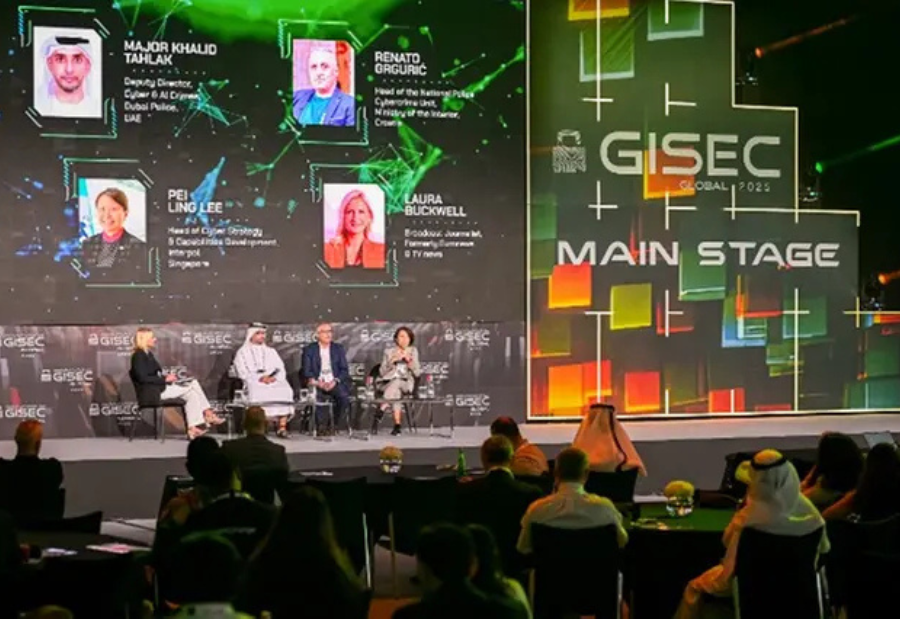The Middle East and Africa’s largest cybersecurity event serves as a critical platform to explore ideas for advanced security infrastructure and coordinated defence strategies
As the Middle East’s major economies continue their accelerated growth, the region is increasingly becoming a prime target for cyber and ransomware attacks. According to the State of the UAE Cybersecurity Report 2025, 21 per cent of cybersecurity incidents targeted banks and financial services in the region, emphasising the urgent need to mitigate potential risks and damages, while enhancing digital infrastructure.
On Thursday, the event placed the focus on the financial sector as global industry leaders and professionals gathered at the Dubai World Trade Centre to drive discussions that help mitigate these challenges and avoid far-reaching consequences.
GISEC Global’s panel discussions and workshops came at a critical time in the ever-growing wave of digitalisation, with banks and businesses managing large quantities of sensitive information, including data, personal details and transaction records.
- Nearly one-fifth of reported cyber incidents caused USD $12 billion in losses to financial businesses in the past 20 years, according to the IMF Global Financial Stability Report.
- The same report shows total losses since 2020 amounted to an estimated $2.5 billion.
Ransomware attacks in the UAE increased by 32 per cent in 2024 compared to the previous year, as per statistics from the UAE Cybersecurity Council.
With cybersecurity businesses accelerating their efforts to safeguard against breaches, fraud and hacking, GISEC Global explored key topics including the resilience and preparedness of banking organisations to deal with threats, and balancing security and innovation given the rise of digital payments.
‘Balancing between compliance and innovation in banking and finance’
As more people shift to digital payments and open banking gains traction, top CISOs discussed how fintechs are adopting robust security measures to navigate the payments landscape.
Babar Haq, CTO, IT at Huawei Middle East & Central Asia, stressed different teams need to come together to get a holistic overview – one balanced between innovation and regulation – to build secure systems.
He said: “The challenge is banks want to secure and protect customers’ data but at the same time there are regulations that need to be followed. Therefore, there needs to be a balance between compliance, innovation and security and I believe the only way to do that is by design – basing cybersecurity on each and every corner of technology.”
AI has bigger role in cybersecurity but is also benefitting hackers
With the advent of AI unleashing big winds of change, impacting a wide range of industries, a survey shows that 80 per cent of bank cybersecurity executives feel challenged in keeping up with AI-driven threats.
Toufic Derbass, Managing Director for the Middle East, Türkiye and Africa at Kaspersky, one of the exhibitors at GISEC Global, said AI brings both opportunities and obstacles that banks and financial institutions should be wary of.
He said: “AI-generated threats are becoming increasingly believable, targeted and sophisticated. Cybercriminals are now using artificial intelligence to craft more convincing attacks, making it harder for traditional defences to keep up.
“While Kaspersky recently reported a 16 per cent drop in overall cyber threats, incidents involving banking malware actually rose by 11 per cent – a stark reminder that threat actors are evolving their tactics, not retreating.
“To stay ahead, financial institutions are turning to AI-powered detection tools and strengthening employee training to reduce human error, still one of the most common points of entry.”
He added: “As generative AI makes scams more convincing, banks must strengthen verification using tools like biometrics, behavioural analytics and real-time document checks. But tech alone isn’t enough. A layered approach – combining smart tech with trained staff – is key. Best practices like multi-factor authentication, regular software updates and verifying sensitive requests via secondary channels also play a crucial role in preventing AI-driven fraud.”
Are resilient technologies the solution, or are comprehensive frameworks needed?
Security tools such as Zero Trust and Cloud Security are among the popular models being leveraged to help businesses protect their data and prevent cyberattacks. With ransomware attacks in the financial sector surging – up by 65 per cent in 2024 – Derbass says businesses need to think outside the box and “adopt multi-layered, next-generation security solutions”.
He said: “An increasingly important threat related to ransomware that we’re seeing is the rise of targeted ransomware groups. Unlike common ransomware attacks, which target victims arbitrarily, targeted ransomware groups are notorious for attacking governments, specific high-profile organisations, or a selective group of people within an organisation.”
“As Middle Eastern banks expand globally, their cybersecurity strategies must adapt to cross-border regulations, varying compliance standards and a broader threat landscape. Since the internet has no borders, cyberthreats will persist and evolve across jurisdictions,” he added.
“To stay protected, banks need globally aligned security frameworks, real-time threat intelligence sharing and compliance teams familiar with international regulations. Flexibility, visibility and collaboration are key to securing operations at scale.”
Organised by Dubai World Trade Centre, GISEC Global 2025 was hosted by the UAE Cybersecurity Council under the theme of ‘Securing an AI-Powered Future’ and supported by Dubai Electronic Security Center (DESC), the UAE Ministry of Interior and Dubai Police. Huawei has been named as GISEC’s Lead Strategic Partner.
The 14th edition brought together critical focus areas from some of the leading players in the industry, including Huawei, AWS, Microsoft, Google Cloud Security, CISCO, Deloitte, Kaspersky, Check Point, Cloudflare and Honeywell, alongside groundbreaking cybersecurity companies such as Spire Solutions, CPX, CyberKnight, LinkShadow, OPSWAT, Qualys, CrowdStrike and StrikeReady.
GISEC Global will return for its 15th edition next year at a new venue, Dubai Exhibition Centre at Expo City, from 5-7 May 2026.
Also read: Viksit Workforce for a Viksit Bharat
Do Follow: The Mainstream formerly known as CIO News LinkedIn Account | The Mainstream formerly known as CIO News Facebook | The Mainstream formerly known as CIO News Youtube | The Mainstream formerly known as CIO News Twitter |The Mainstream formerly known as CIO News Whatsapp Channel | The Mainstream formerly known as CIO News Instagram
About us:
The Mainstream formerly known as CIO News is a premier platform dedicated to delivering latest news, updates, and insights from the tech industry. With its strong foundation of intellectual property and thought leadership, the platform is well-positioned to stay ahead of the curve and lead conversations about how technology shapes our world. From its early days as CIO News to its rebranding as The Mainstream on November 28, 2024, it has been expanding its global reach, targeting key markets in the Middle East & Africa, ASEAN, the USA, and the UK. The Mainstream is a vision to put technology at the center of every conversation, inspiring professionals and organizations to embrace the future of tech.




